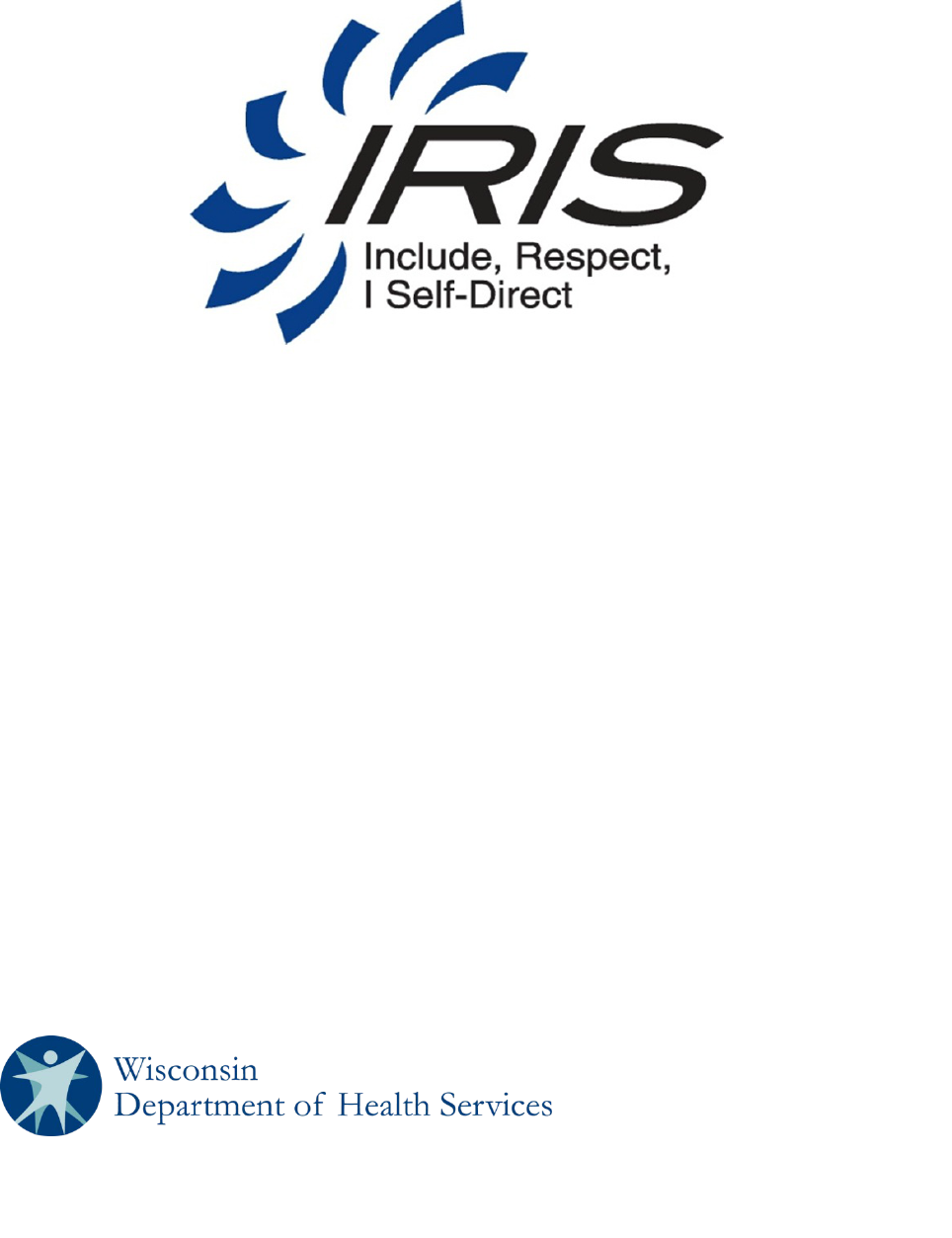
Participant Handbook
Designed to Help You Live Your
Life with the Support You Need
P-01008 (08/2021)
1 | Page
IRIS – Include, Respect, I Self-Direct
Welcome to the Include, Respect, I Self-Direct (IRIS) Program. IRIS is a Medicaid-funded,
long-term care program offered by the Wisconsin Department of Health Services. IRIS is
available in counties where Family Care operates. In IRIS, you have budget authority, which
means that you choose which goods, support and services you will use to achieve your long-term
care goals. You also have employer authority, which means that you are able to hire and manage
your own workers to help you achieve your long-term care goals. IRIS participants may also
choose to obtain workers through an agency. IRIS funds can be used to purchase services that
your family and friends cannot provide. When you build on the help you get from others instead
of replacing it you strengthen your relationships. IRIS funds are used to purchase assistance
where and when it is needed.
IRIS is grounded in the Principles of Self-Determination:
• Freedom to decide how you want to live your life
• Authority over a specific budget amount
• Support to organize resources in ways that are meaningful to you
• Responsibility for your wise use of public dollars
• Confirmation of your important leadership as an advocate
The Intent of this Handbook
This handbook describes the IRIS Program and your role in the program as an IRIS participant.
It also describes who is available to help you and offers ideas and tips for building your own
IRIS plan. It explains your responsibilities in IRIS, as well.
You are the expert on your own life. You know better than anyone what is important to you and
what support you need. IRIS is available to help you achieve your long-term-care-related goals
so you can live your life the way you want.
Participating in IRIS does not mean doing things all by yourself – you will have others to help
you along the way. People with guardians or representatives are welcome to choose IRIS.
2 | Page
Table of Contents
IRIS – Include, Respect, I Self-Direct ............................................................................................ 1
The Intent of this Handbook ........................................................................................................... 1
Living a Self-Directed Life Means ................................................................................................. 4
Help is Available in IRIS ................................................................................................................ 4
The IRIS Call Center: .................................................................................................................. 4
IRIS Consultant Agencies ............................................................................................................... 5
IRIS Consultants ......................................................................................................................... 5
Choosing Your IRIS Consultant ................................................................................................. 5
Your First Meeting ...................................................................................................................... 6
IRIS Fiscal Employer Agents ......................................................................................................... 6
Creating Your IRIS Support and Service Plan ............................................................................... 7
Support and Service Plans are Important .................................................................................... 7
Monthly IRIS Budgets ................................................................................................................ 7
When Additional Money is Needed for My Plan ........................................................................ 8
Getting My Plan Started .............................................................................................................. 8
Changing Your Plan .................................................................................................................... 9
When a Support is Needed Right Away...................................................................................... 9
IRIS Goods, Support and Services Available ............................................................................... 10
IRIS Self-Directed Personal Care ................................................................................................. 11
Goods, Support and Services NOT Covered in IRIS ................................................................ 11
Completing Your Plan How Your IRIS Consultant Can Help .................................................. 11
IRIS Timeline................................................................................................................................ 12
IMPORTANT: Making Your Plan Happen .............................................................................. 12
Obtaining Workers .................................................................................................................... 13
Options for Obtaining Workers or Attendants .......................................................................... 13
Things to Consider When Hiring Workers ................................................................................... 14
Create a Job Description ............................................................................................................... 14
Finding Potential Workers ........................................................................................................ 14
Interviewing Job Applicants ...................................................................................................... 15
Checking References ................................................................................................................. 16
Completing the Caregiver and Criminal Background Check .................................................... 17
3 | Page
Making the Job Offer ................................................................................................................ 17
Benefits for Your Workers ........................................................................................................ 18
Deciding if Your Plan is Working ................................................................................................ 18
The Annual Review ...................................................................................................................... 18
Staying Healthy and Safe .............................................................................................................. 19
Your Responsibilities in IRIS ....................................................................................................... 19
Employer Responsibilities When You Hire Your Own Workers ................................................. 20
Your Monthly Medicaid Cost Share Payment .............................................................................. 20
Filing Complaints and Grievances ................................................................................................ 21
Transferring to a New IRIS Consultant Agency or a New IRIS Fiscal Employer Agent or
Leaving the IRIS Program ............................................................................................................ 22
Answers to Your Questions or for More Information .................................................................. 22
GLOSSARY OF TERMS ............................................................................................................. 23

4 | Page
Living a Self-Directed Life Means
You have many choices in deciding how you want things done. You choose:
• What goods, support and services you need.
• When you want those goods, support and services provided.
• Who will provide those goods, support and services.
• Where you want the goods, support and services provided.
• How to use your IRIS monthly budget effectively and wisely.
Help is Available in IRIS
The IRIS Call Center:
After you are enrolled in the program you will have access to
the Department of Health Services’ Call Center. The Call
Center answers questions you have.
Contact the IRIS Call Center by calling toll free
1-888-515-4747 or by messaging [email protected].

5 | Page
IRIS Consultant Agencies
The Department of Health Services contracts with IRIS consultant agencies that oversee and
support a network of IRIS consultants in your area. These agencies coordinate program
enrollment, provide orientation, handle recordkeeping and process program disenrollment. IRIS
consultant agencies manage overall program quality and ensure program integrity. After the
participant develops a plan with the help of their consultant, the IRIS consultant agency provides
final approval after all requirements are met. These costs do not come out of the participant
budget.
IRIS Consultants
Everyone in IRIS has an IRIS consultant. Consultants value the independence, choice, freedom
and responsibility that IRIS provides. Consultants are knowledgeable about the services in your
area. Consultants help you develop your IRIS plan.
Your consultant is required to meet with you several times each year. You may choose to have
more meetings if you need additional help. You also choose where and when to meet.
Your consultant will:
• Listen to what you want your life to be like.
• Help you figure out how to meet your goals.
• Help you design a plan that fits your budget.
• Make sure all required paperwork is done.
• Assist you to update your plan.
• Help you find workers, service providers and items.
• Assist you in completing all new employer and employee paperwork
and submit these materials to the fiscal employer agent (FEA).
• Help you find places to buy equipment and other supplies.
• Help you explore job opportunities.
• Assist you to develop a backup plan to help keep you safe.
• Measure how well your plan is working.
• Help you understand your responsibility to stay eligible for Medicaid and IRIS.
Choosing Your IRIS Consultant
The IRIS consultant agency you choose will send you information about the IRIS consultants
who are available in your area. You may communicate with the consultants before making a
choice. Before you decide, you may want to ask the consultant:
• How many other people they work with in IRIS.
• How much they know about services in your community.
• How much experience they have working with a person like you (if it is important to you to
find a consultant who understands your culture, disability, etc.).
• What days and times they are available to meet with you.
6 | Page
The consultant you choose will contact you to set up the first meeting. If you wish to change
consultants, contact your IRIS consultant agency for assistance.
Your First Meeting
At your first meeting, your consultant will take time to get to know you and learn what is
important to you.
Your consultant will also explain some of the things you need to know about IRIS, such as:
• How you create an IRIS plan to help you achieve your long-term care goals.
• How your IRIS budget works and how to choose an IRIS fiscal employer agent.
• Your opportunities and responsibilities within IRIS.
• How to contact the IRIS Call Center and your IRIS consultant agency.
• How to make a complaint if you are not satisfied with something.
IRIS Fiscal Employer Agents
The Wisconsin Department of Health Services contracts with IRIS fiscal employer agents. Fiscal
employer agents make sure that tax and employer and employee accounting is properly managed
for any caregivers you hire and manage. Fiscal employer agents also manage other accounting
duties, and they collect and track any cost share payments you might have. These costs do not
come out of your IRIS budget.
Once the IRIS consultant agency signs off on your completed IRIS plan, it shares a copy to your
chosen fiscal employer agent. Your plan provides needed information about your selected
services, what bills to pay, who will be receiving payment and for what amounts. Your fiscal
employer agent will:
• Complete all employer and employee setup duties, including criminal and caregiver
background checks on workers you may hire.
• Collect and account for your monthly Medicaid cost share, if you are required to pay one,
and send you a monthly report listing your payments.
• Assist with verifying provider qualifications and help you make written provider agreements.
• Send payments you authorize to the business(es) or agency listed on your plan that provide
you with goods, support and services. Program rules require that checks are made payable to
the business or agency providing the service which prevents the need to reimburse you.
• Serve as your employer agent and process paperwork and time sheets when you employ
workers directly (see page 14 for information on hiring workers).
• Contact you and your IRIS consultant agency if you request something to be paid that is not
listed in your plan.
• Send you a report listing all payments made from your budget.
• Closely coordinate with your IRIS consultant agency and the Department of Health Services.

7 | Page
See the fiscal employer agent materials for
specific information on Workers’
Compensation Insurance, unemployment,
determining contractor status, having a non-
payroll item paid, and Medicaid cost share
and payments.
Creating Your IRIS Support and Service Plan
Support and Service Plans are Important
All IRIS participants have a written support and service plan. Your plan is based on your long-
term care goals and how you want to achieve them. Your plan lists:
• The goods, support and services you choose.
• The people or agencies you selected to provide the goods, support and services you chose.
• The amount of money your plan will spend on each item or support.
• The goods, support and services you need each month.
When you build your plan, think about the things that will maintain or improve the quality of
your life, such as:
• The things that are the most important to you.
• The unpaid support and services you may be able to use.
• The goods, services and support you may need once or just a few times during the year.
• The number of workers you may need and the type of support they will provide.
• Your interest in being the employer of your workers or using an agency to hire workers (see
page 14 for information on hiring workers).
• Your emergency backup plan, including who will help when your worker is not available.
• How you will know your plan is working.
Monthly IRIS Budgets
Based on your needs, the Department of Health Services estimates how much it will cost to
purchase services in order to meet your needs. When you enroll in IRIS, you will be told the
amount of your budget estimate. This estimate is the amount of money you may spend on the
8 | Page
long-term-care-related goods, support and services that are listed on your approved plan. Once
your IRIS support and services are approved, the total cost to fund your plan is called your IRIS
budget.
Your budget can be adjusted if needed (see the following section). If your health or ability
changes and your plan is not able to meet your needs, your budget may need to change.
When Additional Money is Needed for My Plan
Your IRIS budget is the cost of the goods, support and services listed in your plan. Your budget
is flexible. You may use more in some months and less in others as long as the services are listed
on your plan. You may also shift budgeted dollars between services listed on your plan. You may
set aside money for purchases up to 12 months in the future as long as those goods, support and
services are listed on your plan.
IRIS has a process to make sure that your budget includes enough money to purchase necessary
goods, support and services. If you have tried to create a plan within your IRIS budget and find it
is not enough, then your IRIS consultant prepares and submits a request for additional funds to
the Department of Health Services for review and approval.
There may also be times when you need to purchase a one-time item or service, such as a home
modification or piece of equipment, that is covered by IRIS but will not fit into your budget. In
these situations, your IRIS consultant prepares and submits a budget request to the Department
of Health Services for review and approval.
In either situation, you may write your own request and submit it to your IRIS consultant. There
are a few things to keep in mind when requesting additional funds:
• Describe why the approach you propose is the most cost-effective way to meet your long-
term care needs.
• When possible, your request should include three written cost estimates for the items or
services being requested.
• Remodeling and building projects must meet all building codes.
• Wait for approval before purchasing any goods, support or services included in the request.
Plan to submit a bill for the items to the fiscal employer agent. Program rules require that checks
are made payable to the provider, which prevents the need for reimbursement to you.
Getting My Plan Started
Based on your goals, you decide what goods, support and services will help you achieve your
long-term-care-related goals that are important to you. Make sure to first think about ways your
needs can be met at no cost. When you decide what is most important, consider the following:
• Many things or the help you need can be free.

9 | Page
• Your friends and family can help you, or they may know other people who can. In addition,
your IRIS consultant can link you to other people who use IRIS and who may be interested in
bartering or sharing workers or goods.
• You will want to include the goods, support or services that improve your quality of life. You
will also want to make sure you are finding them for the best price.
• Someone else in the IRIS program may be looking for some of the same help you are. If you
are interested in sharing information you have learned about specific goods, support and
services, tell your consultant who can then share it with others.
• Your IRIS consultant has tools to help you think about and design your plan. You decide
whether to use them and whether you would like your IRIS consultant to help you. These
planning tools are not required but may help you decide what is important to include in your
plan.
Changing Your Plan
You may change your plan to match a change in your needs. Call or send an email to your IRIS
consultant, or contact your IRIS consultant agency directly to update your plan. Changes to your
plan are not effective until the update has been approved by your IRIS consultant agency.
When a Support is Needed Right Away
Occasionally, people’s lives and situations require that they get started in IRIS right away. For
example, Medicaid eligibility for some individuals begins when their IRIS plan starts. If you
need goods, support or services immediately, your IRIS consultant can help you make a
temporary plan. Your consultant agency then makes sure you can get started as quickly as
possible. You may adjust your plan at any time after you begin IRIS.
NOTE: If you are transferring into IRIS from another program there will be no gap in services.
10 | Page
IRIS Goods, Support and Services Available
In addition to your unpaid support and any customized goods and services you choose, other
goods, support and services may be in the following IRIS service categories:
4
• Adaptive aids
• Adult day care
• Adult family home (1-2 bed)*; (3-4 bed)†
• Communication aids
• Consumer education and training
• Counseling and therapeutic resources
• Customized goods and services*
• Daily living skills training*
• Day services
• Home-delivered meals
• Home modifications
• Housing counseling
• Housing startup
• IRIS consultant agency provider
• IRIS fiscal employer agent provider
• IRIS self-directed personal care*
• Nursing*(above MA Card covered)
• Personal emergency response system
• Prevocational services
• Residential care apartment complex
(assisted living facility)
• Relocation related
• Respite*
• Specialized medical equipment and supplies
• Support broker†
• Supported employment*
• Supportive home care*
• Transportation*
• Vocational futures planning
Note Key
*Your qualified spouse, relative, or guardian may provide these items.
†Excludes decision makers.
4
IRIS funds may be used only after other insurance, Medicare or your Medicaid ForwardHealth
Card is determined to be unable to pay for the good, support or service.
11 | Page
IRIS Self-Directed Personal Care
IRIS participants who are eligible for personal care services may receive their personal care from
either a Medicaid personal care agency or through IRIS self-directed personal care. IRIS services
can complement any personal care you are eligible for and the cost is paid outside of your
monthly IRIS budget. The IRIS self-directed personal care agency coordinates obtaining
physician orders and nurse oversight for this service. You may choose to either self-direct your
personal care or receive your personal care from a Medicaid personal care agency. Ask your
consultant about this option if you are interested in self-directing your personal care.
Goods, Support and Services NOT Covered in IRIS
IRIS is designed to keep you in control of your life. However, there are goods, support and
services that cannot be purchased with IRIS funds, including:
• Goods or services covered by health insurance, your Medicaid ForwardHealth Card or
Medicare.
• Goods or services that are the responsibility of another agency (such as educational services
for persons up to age 21 years and vocational services provided by the Wisconsin
Department of Vocational Rehabilitation).
• Your room and board, including your rent, mortgage payment or utilities.
• Experimental goods and/or treatments.
5
• Goods, support and services that are not directly related to your long-term-care-related goals
or needs or those that are intended to benefit others.
Completing Your Plan
How Your IRIS Consultant Can Help
You can develop your plan by yourself or with others. Your consultant or your IRIS consultant
agency will help you as much as you request. All plans are reviewed to make sure they meet
IRIS program standards. If your plan does not meet the standards, your IRIS consultant agency
or your IRIS consultant will contact you to discuss your options.
Once your plan is reviewed and approved, you will receive a letter that informs you of your IRIS
start date. A copy of this letter is sent to others who need to be informed that you are enrolled in
IRIS.
5
Your IRIS consultant can help you determine what goods, support or services are considered experimental.

12 | Page
IRIS Timeline
Please refer to the timeline below for an illustration of the planning process and the time
associated with each step.
What Happens
When it Happens
You choose your IRIS consultant
agency (ICA) at the Aging and
Disability Resource Center
Your referral date
Your ICA contacts you with a
welcome call
Within 3 days of your referral
date
You select your consultant or one is
assigned to you on the fourth day
Within 3-4 days from your
welcome call
Your consultant has an initial visit
with you
Within 14 days of your referral
date
You and your consultant develop
your IRIS plan and submit it to your
ICA for approval
Within 30 days of your initial
visit
You select your IRIS fiscal
employer agent
Within 30 days of your initial
visit
Your IRIS plan is reviewed,
approved and is implemented;your
IRIS start date is established
Within 45 days from initial visit
Your IRIS enrollment is complete
and your plan is activated
IMPORTANT: Making Your Plan Happen
You can begin to arrange the services, support and goods in your plan while your IRIS
consultant agency is reviewing your plan. However, you cannot begin to receive IRIS funded
services until the review is complete, your plan is approved and activated, and the service is
authorized. This includes any workers you hire, as they may not begin work until after they have
completed all paperwork and have successfully passed required background checks.
Workers
may not work more than 40 hours each week without prior approval and the timesheet
you and your worker sign should not have more hours than are listed on your approved
IRIS plan.

13 | Page
Obtaining Workers
There are several ways to obtain workers to provide services such as supportive home care,
respite, job coaching or personal care. You have different rights and responsibilities based on the
option you choose. You may:
• Be an employer and hire workers directly (your fiscal employer agent serves as your
employer agent and pays workers from submitted time sheets). These workers are referred to
as “participant hired workers.”
• Manage the workers you choose with assistance of an agency with choice provider.
• Recommend workers to be hired and managed by a co-employment or leasing agency.
• Use a provider agency to supply the services you need using the workers they have on staff.
Options for Obtaining Workers or Attendants
You buy agency
services
The agency chooses,
employs and manages
the workers.
Your IRIS fiscal
employer agent pays
the agency invoice.
You recommend
workers
The workers you
recommend are
employed and managed
by an agency with
choice or leasing
agency. Your IRIS fiscal
employer agent pays the
agency invoice.
You manage the
workers
The workers you
choose are employed by
the agency with choice
provider.
Your IRIS fiscal
employer agent pays the
agency invoice.
You are the employer
You make all employer
decisions. Your IRIS
fiscal employer agent
serves as your
employer agent and
handles all payroll-
related tasks.
14 | Page
Things to Consider When Hiring Workers
Answering these questions may help you decide what you are looking for in the workers you
choose to hire:
• Do I need more than one worker to help me?
• How often do I want help? Part-time or full-time?
• What time of day and what days of the week do I need help?
• Can the worker’s time be flexible?
• What hourly pay will the worker receive?
• Does my budget amount allow any worker benefits?
• What exactly do I need the worker to do? How do I want the work done?
• Does the worker need to be able to drive me places?
• How will I handle the training the worker needs?
• Do I prefer someone with a particular skill or experience?
• Does the worker need to be able to lift a certain number of pounds?
• Do I need different workers to help me with different things?
• Do I want the worker to be a friend, neighbor, or family member?
• Is a person I know and who wants to help me the best worker for the job?
• How I will schedule a worker so they do not work more than 40 hours per week without prior
approval?
Create a Job Description
Writing a good job description will help you prevent future misunderstandings. It is as important
to your worker as it is to you to be clear on what the job entails. Include detailed information,
such as short descriptions of the parts of the job and when you need the work to be completed.
Finding Potential Workers
Once you know what you are looking for in a worker, you will want to find the best worker to do
the job. Your IRIS consultant can help you. Good places to find a worker might include:
• People you already know, including your family and friends
• Local organizations for elders or people with disabilities
• Church, synagogue or place of worship
• Local college or university
• Employment agency and job service
• Local newspaper
• Bulletin board at local organizations
• Online resources
You may want to place an advertisement online or in the newspaper’s help wanted section.
Consider all the ways that you might locate a person who can do the job. Find out if you will
need to spend money on an ad. You may use your IRIS budget to pay for the cost of an ad.

15 | Page
A help wanted ad should include:
• A description of the hours you want someone to work
• A general description of what you want a worker to do
• Instructions on how to apply for the job
Don’t include more information than is needed in your ad. For example, do not include your
address or mention that you live alone. It is a good idea to require each applicant to complete a
written application. IRIS will provide you a sample job application and job description.
A job application should include information on the applicant’s:
• Name, address, phone number
• Training or educational background
• Skills and work experience
• References
• Authorization to check references
• Certification of truthfulness
• Signature
Interviewing Job Applicants
You may want to conduct a brief telephone interview with interested applicants before you
interview them in person. Make sure you ask questions about their past work history, whether
they are able to perform specific job duties, and how they would handle specific situations.
One of the first steps to schedule an in-person interview is to decide where the interview should
take place. If you are not comfortable interviewing in your home, decide on a different place to
meet the person. You may want to meet in a public place, such as a library, coffee shop or
restaurant. You may also arrange to have a friend with you at the interview.
Interviews should cover some basic topics:
• Tell the applicant about the job and what you want them to do for you, and provide a copy of
your job description.
• Tell them about any household pets in case they have pet allergies.
• Ask open-ended questions instead of those that can be answered yes or no.
• Talk about when you need a worker to start.
• Discuss the time sheet requirements and how the IRIS fiscal employer agent serves as the
employer agent, handling all payroll, payroll taxes and any other withholding.
• Discuss the job’s hourly pay and benefits and how raises are obtained.
• Let the person ask some questions.
• Tell them a caregiver and criminal background check is required.
16 | Page
• If they have not already given you one, ask the applicant for a list of references with contact
information so you can contact their previous employers.
• Make certain the applicant understands that you are the employer, not IRIS, your IRIS
consultant, IRIS consultant agency, or the fiscal employer agent.
Some questions to ask during an interview:
• What kind of experience do you have?
• What are you looking for in a job?
• What motivates you to do your job well?
• What skills do you have that would help you do this job?
Don’t forget to thank the person for their time. Let them know when you expect to make your
decision and how you will notify them of your decision.
IMPORTANT TIP – Some questions you should NOT ask during an interview:
• How old are you?
• How much do you weigh?
• Are you married or do you have a life partner?
• Do you have children? Are you planning to have more?
• Are you dating anyone?
• Have your wages ever been garnished?
• Do you have a disability?
• How often do you drink alcohol?
• What is your religion, race or ethnicity, politics?
Checking References
Checking previous or current employer references can give you insight on how the applicant you
are considering might actually work out. To check references, call the people listed as references
and ask about the applicant.
Some good questions are:
• How do they know the applicant?
• What kind of work did the applicant do for them?
• What are the applicant’s strengths?
• What are the applicant’s weaknesses?
• Would they hire the applicant again? Why or why not?
• Does the applicant show up on time?
• Does the applicant show up regularly?
• Does the applicant call when they will be late or may not be able to work?
• Does the applicant bring personal problems to the job?

17 | Page
• Using a scale of 1-10 , how well did the applicant do the job that was required of them? Ask
them to explain their ranking.
• Ask questions related to the qualities you want in a worker. For example, is the applicant
honest? Does the applicant respect other people?
Completing the Caregiver and Criminal Background Check
Your IRIS fiscal employer agent completes criminal background checks on your workers for
you. Your consultant will help you complete the necessary forms and will ensure they are sent to
your fiscal employer agent for processing.
Some serious convictions may disqualify an applicant from being your employee and having
wages paid with IRIS funds. Worker wages cannot be paid with IRIS funds until all worker
screening and setup is complete.
Making the Job Offer
Based on what you have learned about the applicant, make the best decision you can about
whether the worker is right for you. If you decide to hire the person, call and let the individual
know you want to hire them for the job. Restate what the job pays. If the person accepts your job
offer, decide on a start date.
Let the people you didn’t hire know that you selected someone else. You don’t need to tell them
why they were not selected. Simply explain that you chose someone with skills that better fit
your needs. You may wish to notify them by sending a letter. Be certain your selected applicant
accepts the job before informing any applicant you did not choose.

18 | Page
As quickly as possible after you’ve made your decision to hire, have the selected individual
complete the new hire forms your IRIS consultant agency will provide to you:
• Form I-9 to demonstrate work eligibility
• Wage and hour agreement
• Form W-4 for income tax withholding purposes
• Medicaid provider agreement
Send these completed forms, along with a copy of the worker’s Social Security card, to your
IRIS fiscal employer agent. Your consultant can help you complete and submit these forms if
you need help.
Benefits for Your Workers
You may use your IRIS budget to purchase benefits such as time off. Workers’ Compensation
Insurance protects workers who could be hurt on the job and is provided outside of your IRIS
budget. Your IRIS fiscal employer agent or your IRIS consultant can provide more information
about purchasing benefits for your worker(s).
Deciding if Your Plan is Working
You are the best person to decide if your IRIS plan is working or if it needs to change. You
might want to consider questions like:
• Am I any closer to reaching my goals?
• Do I work at the job I want, with the hours and wage I want?
• Am I involved in my community as I choose?
• Do I spend time doing the things I enjoy?
• Do I spend enough time with the people I care about?
• Are my workers doing things the way I want them to be done?
• How does my plan improve my life?
The Annual Review
Your eligibility for IRIS will be verified each year. The
verification includes:
• Your Medicaid financial eligibility, which is conducted by your county income maintenance
office.
• Your Medicaid functional eligibility. Your IRIS consultant agency will notify you in advance
of this date and will schedule a meeting with you to review your long-term care functional
screen, which documents your continued Medicaid functional eligibility.
• Meeting with your IRIS consultant to discuss your IRIS plan.

19 | Page
Staying Healthy and Safe
IRIS is a Medicaid waiver program and is obligated to ensure the health and safety of all IRIS
participants. It is your responsibility to report any incident that you know or suspect has
endangered you or any IRIS participant.
The following are examples of reportable incidents and include actions done by others, such as
family, friends, caregivers, service providers, or persons in your community:
• Abuse or neglect
• Crimes
• Death
• Falls or injuries
• Hospitalization
• Medical or health emergency
• Medication errors
• Misuse of finances
• Property damage
If you know or suspect any of these incidents occurred,
contact your IRIS consultant agency as soon as possible
within the next 24 hours. If time has passed since an
incident occurred, you should still report it.
If you or someone you know is being abused or neglected, call your local law enforcement or
your county adult protective services office to make a report. In addition, notify your IRIS
consultant agency of the critical incidents that occur.
Your Responsibilities in IRIS
You have some important responsibilities to fulfill to ensure your success with IRIS. Help is
available to help you meet your responsibilities. Your responsibilities include:
• Participating in the IRIS orientation provided.
• Working in cooperation with the IRIS consultant you choose and letting them know how
much help you want.
• Building an IRIS plan that meets your long-term care goals.
• Listing all of the IRIS-paid goods, support and services on your plan.
• Arranging to get the goods, support and service you need and keeping certain records of the
services you receive.
• Making an emergency backup plan.
• Providing information to your fiscal employer agent so people and companies that provide
you services, support or goods are paid after services are received.
20 | Page
• Reporting critical incidents to your IRIS consultant agency. Reporting hospitalizations,
nursing home or institutional admissions to your IRIS consultant agency.
• Maintaining your IRIS program eligibility, including your Medicaid functional and financial
eligibility.
• Paying any required Medicaid monthly cost share amount (see below).
• Making sure your providers complete Medicaid Provider and Service Agreements.
• Allowing IRIS access to information it needs to maintain your eligibility or to serve your
long-term-care-related needs.
Employer Responsibilities When You Hire Your Own Workers
• Reviewing the employer startup packet provided by your consultant
• Reviewing the employee startup packet with each of your employees
• Making sure your workers’ pay rate, time off and any benefits are all within program
guidelines
• Completing and submitting all required employer and employee startup paperwork to your
IRIS fiscal employer agent before your employee begins working (your consultant will help
you complete these forms)
• Managing and supervising your workers
• Scheduling any workers you hire so they do not work more than 40 hours each week without
prior approval.
• Completing and approving your workers’ time sheets and submitting them to your IRIS fiscal
employer agent in time for published payroll deadlines
• Approve time sheets for hours worked that do not exceed the hours authorized on your IRIS
plan
• Approving payment for services within the service authorization on file.
Your Monthly Medicaid Cost Share Payment
If your Medicaid eligibility requires that you pay a monthly cost share payment, it is your
responsibility to pay that amount each month to remain eligible for Medicaid and IRIS. Your
county income maintenance office will inform you if you are required to make a monthly
payment. Failing to make these required payments places your Medicaid and IRIS eligibility at
risk. Cost share payments are due at the beginning of each month and should be sent to your
IRIS fiscal employer agent.
Make cost share payments payable to IRIS, and send them to your chosen IRIS fiscal employer
agent.If you have questions about making a cost share payment, please contact IRIS at
1-888-515-4747.

21 | Page
Filing Complaints and Grievances
If you have a complaint or grievance about IRIS first contact your IRIS consultant or your IRIS
consultant agency. You may also call the toll-free hotline 1-888-203-8338 and ask to speak to a
program representative, or email DHS IRIS Grievances at D[email protected].
You may obtain assistance from an ombudsman, who will help investigate and resolve IRIS-
related issues. There are two ombudsmen depending on your age.
If you are age 18-59, your IRIS ombudsmen is available through Disability Rights Wisconsin at
three regional offices:
Madison
Disability Rights Wisconsin
1502 West Broadway, Suite
201
Madison, WI 53713
608-267-0214
TTY: 888-758-6049
Fax: 833-635-1968
Toll Free: 800-928-8778
Milwaukee
Disability Rights Wisconsin
6737 W. Washington Street,
Suite 3230
Milwaukee, WI 53214
414-773-4646
TTY: 888-758-6049
Fax: 833-635-1968
Toll Free: 800-708-3034
Rice Lake
Disability Rights Wisconsin
217 W. Knapp Street
Rice Lake, WI 54868
715-736-1232
TTY: 888-758-6049
Fax: 833-635-1968
Toll Free: 877-338-3724
If you are age 60 or above, your IRIS ombudsman is the Board on Aging and Long-Term Care,
with offices located throughout the state, at:
Board on Aging and Long-Term Care
Toll Free: 1-800-815-0015
Complaints and grievances not settled with your IRIS consultant agency, your IRIS fiscal
employer agent, or with the ombudsman may be directed to the Wisconsin Department of Health
Services:
Department of Health Services
P.O. Box 7851
1 W. Wilson Street, Room 665
Madison, WI 53707-7851
608-266-1865
TTY: 888-701-1251
Email: [email protected]
Website: https://www.dhs.wisconsin.gov/iris/index.htm

22 | Page
Transferring to a New IRIS Consultant Agency or a New IRIS
Fiscal Employer Agent or Leaving the IRIS Program
You may choose to transfer to another IRIS consultant agency available in your area at any time.
You can contact your local Aging and Disability Resource Center to make the transfer.
If you want to transfer to a new fiscal employer agent, contact your IRIS consultant who can help
you transfer.
You may choose to leave the IRIS program at any time. It is important that you let the program
know you are leaving. Please inform your IRIS consultant agency to help you with this process.
You can also contact your Aging and Disability Resource Center. You may return to IRIS
provided you remain eligible and meet your program responsibilities.
Answers to Your Questions or for More Information
Contact IRIS if you would like additional assistance.
The IRIS Call Center
Voice and TTY: 1-888-515-IRIS (4747)
Email: [email protected]
Website: https://www.dhs.wisconsin.gov/iris/index.htm
23 | Page
GLOSSARY OF TERMS
IRIS – INCLUDE, RESPECT, I SELF-DIRECT
Wisconsin’s self-directed support program through which you self-manage your long-term care
goods, support and services within your IRIS budget. IRIS funding can purchase goods, support
and services you choose related to your long-term care outcomes that your friends and family do
not already provide. IRIS serves as an alternate choice to managed long-term care programs.
IRIS BUDGET
The money needed to fund your ongoing services that excludes one-time or high-cost items.
Your budget is based on your needs and can be changed if needed. The amount of your budget
estimate will be shared with you before you choose IRIS. After you have a plan, your budget is
the cost of IRIS-funded services listed in your support and service plan.
IRIS CONSULTANT/CONSULTANT
A trained individual in your community who helps you understand IRIS requirements, helps you
develop and implement a support and service plan, and provides assistance as you request.
IRIS CONSULTANT AGENCY
An agency under contract with, and certified by, the Department of Health Services that handles
day-to-day IRIS operations; trains, supervises and supports IRIS consultants; reviews support
and service plans; and answers questions you, families, providers and others may have. You
choose your IRIS consultant agency at your local Aging and Disability Resource Center.
IRIS FISCAL EMPLOYER AGENT
The agency under contract with, and certified by, the Department of Health Services that handles
employer agent functions, pays the workers and providers you hire, collects cost share payments,
completes expenditure reporting, and helps you monitor your IRIS spending. Your IRIS
consultant can help you choose your IRIS fiscal employer agent.
IRIS PARTICIPANT
The person enrolled in the IRIS program, which includes Wisconsin frail elders and adults with a
physical or developmental disability who meet the eligibility criteria. In IRIS, you are the
participant, and you choose to self-manage your long-term care goods, support and services.
IRIS SELF-DIRECTED PERSONAL CARE
IRIS participants eligible for Medicaid personal care may self-direct their personal care or
receive agency-based Medicaid personal care.
24 | Page
IRIS SUPPORT AND SERVICE PLAN
A written plan you develop, either alone or with help, that lists the goods, support and services
you choose to meet your goals and long-term care needs; the cost of services; their frequency;
and the provider of each service. Unpaid goods and support, as well as any Medicaid-funded
services you receive, are also listed on your plan. Your plan also includes goods, support and
services you receive at no cost.
MEDICAID
Also called Title XIX, Title 19 and MA, is a state- and federal-funded program that purchases
certain health-related goods, support and services.
SELF-DETERMINATION
A broad concept that means you have control of your life and are a valued citizen in society.
Self-determination is based on five basic principles:
1. Freedom to decide how you want to live your life
2. Authority over a specific budget amount
3. Support to organize resources in ways that are meaningful to you
4. Responsibility for your wise use of public dollars
5. Confirmation of your important leadership as an advocate
WISCONSIN DEPARTMENT OF HEALTH SERVICES
The Wisconsin department that sponsors IRIS. The Federal Centers for Medicaid and Medicare
Services authorize IRIS through Section 1915(c) of the Social Security Act.

25 | Page
NOTES

